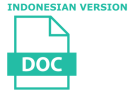Variasi Metode Dalam Pembelajaran Membaca di Program Studi Bahasa Jepang di Sekolah Vokasi UGM
Wahyu Handayani Setyaningsih(1*)
(1) Universitas Gadjah Mada
(*) Corresponding Author
Abstract
Learning method is one of the important aspects to reach the aim of learning. In foreign language learning, especially in Japanese, various method is needed in order to improve the student’s skill and also give chance to the students to be more active in learning Japanese. This paper aims to explore the impact of various method used in Japanese learning in Vocational College, UGM. Based on the research, there are several impact on various method use to the student’s learning outcome. First, the students become more active in learning and show their opinions. Second, various method build the student’s self-reliance, and third, improving the student’s skill of communication, especially in Japanese.
Keywords
Full Text:
PDFReferences
Arends, R.I. 2008. Learning to Teach: Belajar untuk Mengajar. Yogyakarta: Pustaka Pelajar.
Arikunto, S. 2007. Dasar-dasar Evaluasi Pendidikan. Jakarta: Bumi Aksara.
Azwar, S. 2006. Reliabilitas dan Validitas. Yogyakarta: Pustaka Pelajar.
Chiu, M.M. 2004. Adapting Teacher Interventions to Student Needs During Cooperative Learning: How to Improve Student Problem Solving and Time on-task. American Educational Research Journal, 41, 365-399.
Croce, L. 2007. The Effect of Cooperative Learning on Elementary School Student’s Academic Achievement and Pro-Social Behavior. Cortland: Degree Master of Science in Teaching.
Djafri, Fatmawati. 2012. Tingkat Kecemasan Bahasa Asing dan Penerapan Pembelajaran Kolaboratif di Program Studi Bahasa Jepang Sekolah Vokasi Universitas Gadjah Mada. Yogyakarta: Laporan Akhir Penelitian Sekolah Vokasi UGM.
Hapsari, Elisabeth Widyaning. 2010. Penggunaan Metode pembelajaran kooperatif STAD untuk meningkatkan prestasi Bahasa Indonesia pada siswa SMP. Yogyakarta: Tesis UGM.
Helmi, Ryzka Adhiyani. 2011. Pengaruh Metode Pembelajaran Kooperatif Jigsaw Terhadap Prestasi Belajar Biologi pada Siswa SMA. Yogyakarta: Tesis UGM.
Jauhar, Muhammad. 2011. Implementasi Paikem dari Behavioristik Sampai Konstruktivistik. Jakarta: Prestasi Pustakarya.
Kolawole, E.B. 2008. Effect of Competitive and Cooperative Learning Strategies on Academic Performance of Nigerian Students in Mathematics. Educational Research and Review Academic Journal, 3 (1), 033-037.
Kundharu Saddhono dan St. Y. Slamet. 2012. Meningkatkan Keterampilan Berbahasa Indonesia, Bandung: Karya Putra Darwati.
Mansur, H.R. 2015. Menciptakan Pembelajaran Efektif Melalui Apersepsi. Widyaiswara LPMP Provinsi Sulawesi Selatan E-Buletin, Edisi Februari 2015, ISSN. 2355-3189.
Setyaningsih, Wahyu Handayani. 2016. Penerapan Metode Pembelajaran Kooperatif Tipe Paired Story-Telling Dalam Mata Kuliah Membaca Pada Program Studi Bahasa Jepang. Laporan Penelitian Sekolah Vokasi UGM.
Seo, Sueyon. 2014. Does Reading Aloud Improve Foreign Language Learner’s Speaking Ability? Dalam GSTF International Journal on Education (JEd) Vol.2 No.1, Edisi Juni 2014.
Winkel, W.S. 1996. Psikologi Pengajaran. Jakarta: Gramedia
Zakaria, E. dan Iksan Z. 2007. Promoting Cooperative in Science and Mathematics Education: A Malaysian Perspective. Eurasia Journal of Mathematics, Science, and Technology Education, 3 (1), 35-39.
https://www.nsa.gov/news-features/declassified-documents/cryptologic-spectrum/assets/files/foreign_language.pdf. (diakses 5 Agustus 2017, pukul 00.53)
Article Metrics
Refbacks
- There are currently no refbacks.
Copyright (c) 2017 The Author(s)

This work is licensed under a Creative Commons Attribution-ShareAlike 4.0 International License.







